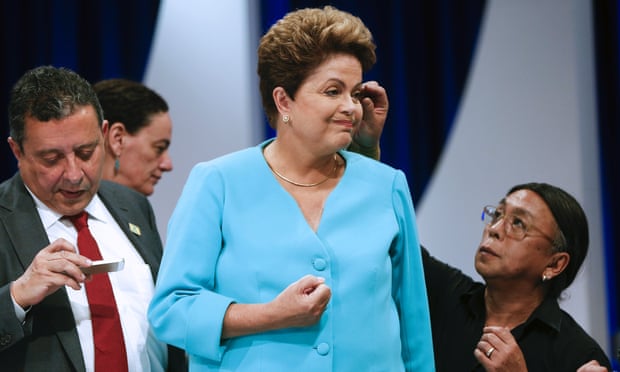
Dilma Rousseff defiant amid calls for resignation over corruption scandal
Follow @KonnieMoments1
Dilma Rousseff’s hopes of seeing out her four-year term took a major
hit when the PMDB voted to leave the governing alliance: ‘This is her
D-Day’ says analyst
Scroll down for video ....
President Dilma Rousseff’s hopes of seeing out her term of office have received a potentially fatal blow after the biggest party in the Brazilian congress voted to abandon her ruling coalition.
The vote by the Brazilian Democratic Movement party (or PMDB) could trigger a defection from Rousseff’s coalition by other smaller parties, and greatly increase the prospect that she will lose an impeachment vote in the lower house next month and be suspended from office.
To cries of “Workers party out!” and “Onward Brazil!”, PMDB leaders announced their decision to break up the coalition.
“We’re going to try to change the country. The economic and social crisis is very serious,” senator Romero Juca, the PMDB’s first vice-president, told a party meeting in the capital Brasilia.
Rousseff now leads a fragile minority government. Senior officials in the governing Workers party insist the president can still be saved from what they say is a coup attempt against an elected leader who still has more than half of her four-year mandate to serve.
Their hopes depend on securing support from individual members of the PMDB, which is a far from united party. Three PMDB ministers have indicated they may defy orders to quit the cabinet by 12 April.
But government efforts to shore up support look increasingly desperate after the PMDB – which has 68 of the 513 seats in the lower house – decided to leave an alliance that has propped up the government for more than 13 years.
Scroll down for video ....
President Dilma Rousseff’s hopes of seeing out her term of office have received a potentially fatal blow after the biggest party in the Brazilian congress voted to abandon her ruling coalition.
The vote by the Brazilian Democratic Movement party (or PMDB) could trigger a defection from Rousseff’s coalition by other smaller parties, and greatly increase the prospect that she will lose an impeachment vote in the lower house next month and be suspended from office.
To cries of “Workers party out!” and “Onward Brazil!”, PMDB leaders announced their decision to break up the coalition.
“We’re going to try to change the country. The economic and social crisis is very serious,” senator Romero Juca, the PMDB’s first vice-president, told a party meeting in the capital Brasilia.
Rousseff now leads a fragile minority government. Senior officials in the governing Workers party insist the president can still be saved from what they say is a coup attempt against an elected leader who still has more than half of her four-year mandate to serve.
Their hopes depend on securing support from individual members of the PMDB, which is a far from united party. Three PMDB ministers have indicated they may defy orders to quit the cabinet by 12 April.
But government efforts to shore up support look increasingly desperate after the PMDB – which has 68 of the 513 seats in the lower house – decided to leave an alliance that has propped up the government for more than 13 years.
David Fleischer, political science professor at the University of Brasília, said the defection would create a domino effect that is likely to topple Rousseff.
“This is her D-Day,” he said. “[Now the PMDB has left] the possibility of her impeachment increases to 90%.”
The president’s opponents will now have an increased majority on the impeachment committee which could give the go-ahead for a full congressional vote, most likely on 17 April, Fleischer said.
The departure of the PMDB marks a new low in a protracted political crisis triggered by efforts to unseat Rousseff following the Operation Lava Jato (Car Wash) revelations of money laundering, price fixing and bribery at the state-run oil company, Petrobras.
Rousseff’s enemies are attempting to launch impeachment proceedings on several grounds, including ongoing investigations into alleged budget irregularities and campaign finance violations.
The president has insisted there is no legal basis for impeachment, telling reporters last week that any attempt to remove her from power without legal justification would represent a “coup”.
The political trench warfare has paralysed decision making in Brasília, worsening an economy that is deep in recession and heightening public anger. More than a million protesters took to the streets earlier this month in a huge anti-government demonstration.
If 342 of the 513 deputies approve, the impeachment process would move to the senate and Rousseff would be suspended for 180 days while Brazil’s vice-president, Michel Temer – leader of the PMDB – would become interim head of state. A final decision on whether to formally remove her from office would then be taken sometime around October.

Photo: Andre Penner/AP
Brazil’s president, Dilma Rousseff, faces many blows as Moody’s downgrades her country’s debt.
Senator Aecio Neves, leader of the opposition Brazilian Social Democracy Party (or PSDM), said he and the leaders of five other opposition parties were ready to back a transitional government led by Temer.
“Rousseff’s government is finished. The departure of the PMDB is the last nail in the coffin of a dying government,” said Neves, who narrowly lost to Rousseff in the 2014 election.
Carlos Pereira, a political scientist at the Brazilian School of Administration, concurred that the chances of the president’s removal have increased considerably.
“The exit of PMDB will fatally encourage other smaller parties to abandon the coalition, bringing the Dilma government to a state of political isolation,” he said, predicting the vice-president would reap the benefits ahead of the next election in 2018. “The potential Temer government would be a sort of government of national salvation in the sense that virtually all the political forces will most likely support him. It will be a transitional government and so will have a narrow margin for error.”
A party of influence brokers rather than ideologues, the PMDB has steadily increased its presence in the government even as it has wavered in its support. Until Monday, it held seven ministerial posts as well as the vice-presidency.
But it has long been divided about its loyalties to the administration. Since last year, PMDB member and lower house speaker Eduardo Cunha has openly plotted against Rousseff. In December, he gave the green light to impeachment proceedings based on accusations that the government window-dressed its accounts before the last election.
The party is now pushing to secure power for itself, though it is unlikely to be any less vulnerable to corruption allegations. Cunha and other senior PMDB figures have been implicated, along with politicians of all stripes, in the Petrobras scandal.
PMDB defections from the ruling camp have increased steadily. The most recent to go was the tourism minister, Henrique Eduardo Alves, who quit on Monday. Even before Tuesday’s vote, domestic newspapers carried leaks of the policy agenda, including welfare cuts, that the PMDB plans to carry out if it takes power.
The consequences and repercussions of such a move could be tumultuous. Political tensions are already high. None of the potential replacements for Rousseff have clean hands. Senior Workers party officials say the impeachment charges are trumped up by opponents who were unable to accept election defeat.
Former president Luiz Inácio Lula da Silva said the attempt to unseat Rousseff was a coup, similar to those used in recent years against leaders in Paraguay and Honduras. He warned on Monday that Brazil’s 31-year-old democracy was at risk.
“It seems to me the opposition have tried to make it impossible for her to govern Brazil,” he said. “They should allow her to have her time to rule this country. Let voters be the judges at the end of her term. If she doesn’t do well, we will respect the decision of electorate.”
If Rousseff is removed, she would not be the first elected Brazilian president to be forced from office. Fernando Collor de Mello resigned in 1992 in the midst of an impeachment fight he appeared certain to lose.
Credit: guardian
Lets us know what you think of this article. Like? Dislike? Funny? Interesting? Cool? Drop us a line in the comment box or join us on facebook and twitter to help us give you a better reading experience
No comments:
Post a Comment